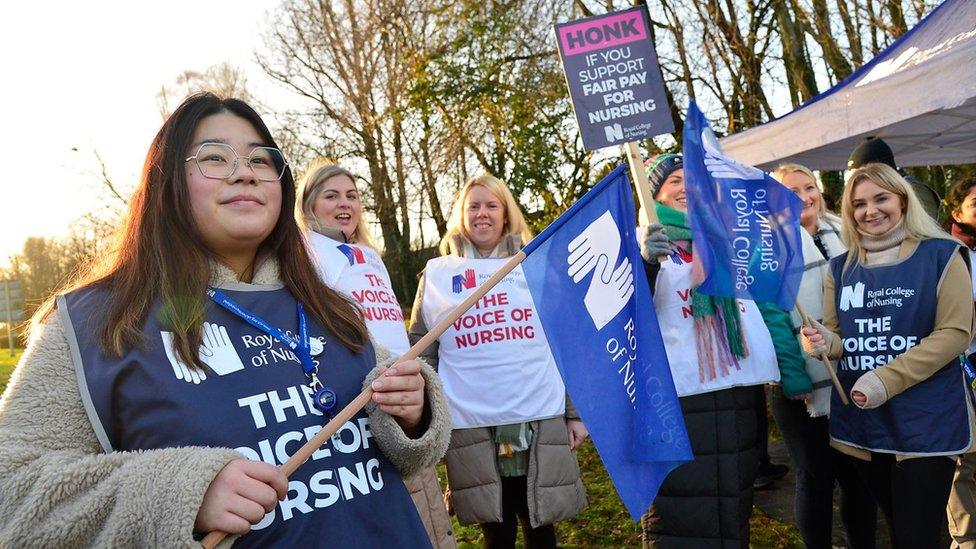NI strikes: Ambulance staff and nurses among 20,000 to walk out
- Published
Striking healthcare workers say they are underpaid and their departments do not have enough staff
More than 20,000 healthcare staff in Northern Ireland have begun a one-day strike as part of a pay dispute.
The move from Unite, Unison and Nipsa members, will involve some nurses, ambulance and hospital support staff.
Workers were told they would get a 2022-23 pay award of £1,400, but unions said this would not settle the dispute as it was lower than inflation.
Ambulance staff includes paramedics, call handlers and support workers.
Under trade union law, emergency cover will still be provided and staff can leave the picket lines to attend.
Trusts have been in contact with patients who will be affected and further details are available on trusts' websites.
Nipsa spokesperson Patrick Mulholland told BBC's Good Morning Ulster programme staff can no longer continue working under current conditions.
"This time it's about defending the fundamentals of the health service and unfortunately that means taking industrial action to get the message across," he added.
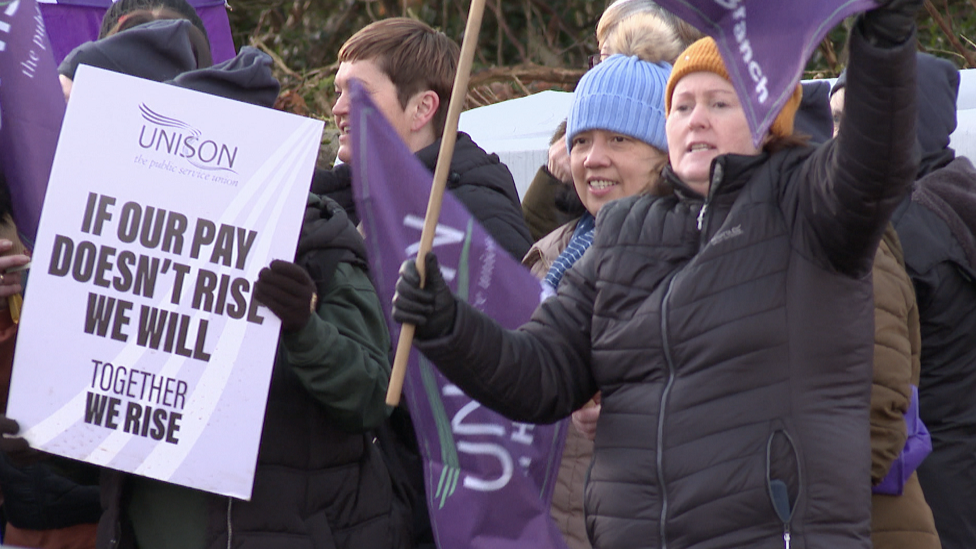
Unison members on the picket line outside Antrim Area Hospital
Mr Mulholland said meetings had been held between management and trade unions to ensure "life and limb" was protected during strike action and called on politicians to invest more money in healthcare services.
"We're not going to be down the same track again in another three or four years' time," he said.
"This time we're fighting this out to the point where we get decent pay, decent mileage and staffing we need for the health service."
'We've had enough'
Colin Quinn from Downshire psychiatric hospital in Downpatrick, County Down, said "something needs to be done" to help healthcare workers affected by the cost-of-living crisis.
"We were out on strike in December, we're back here again today," he said.
"Everybody's speaking with a clear voice here today, everybody's saying the same thing.
"We need valued, we need paid appropriately and we've had enough and this is going to continue unless they do something about it."
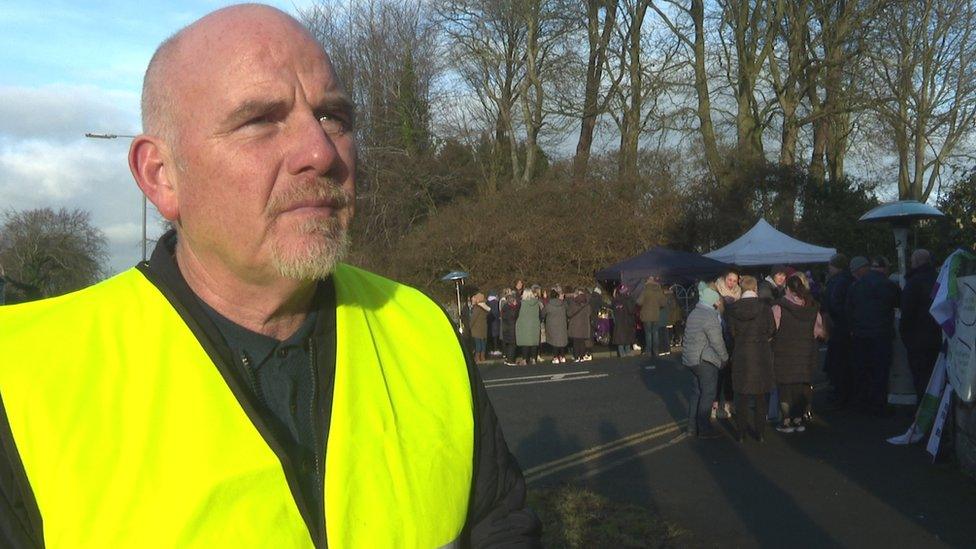
Colin Quinn says healthcare workers have "had enough"
'Completely broken'
Deirdre Murphy, a staff nurse at Daisy Hill hospital in Newry, County Down, said the health service is "not on its knees, it's flat on the ground".
She said it was "completely broken" with A&E patients lying on floors, waiting days for a bed.
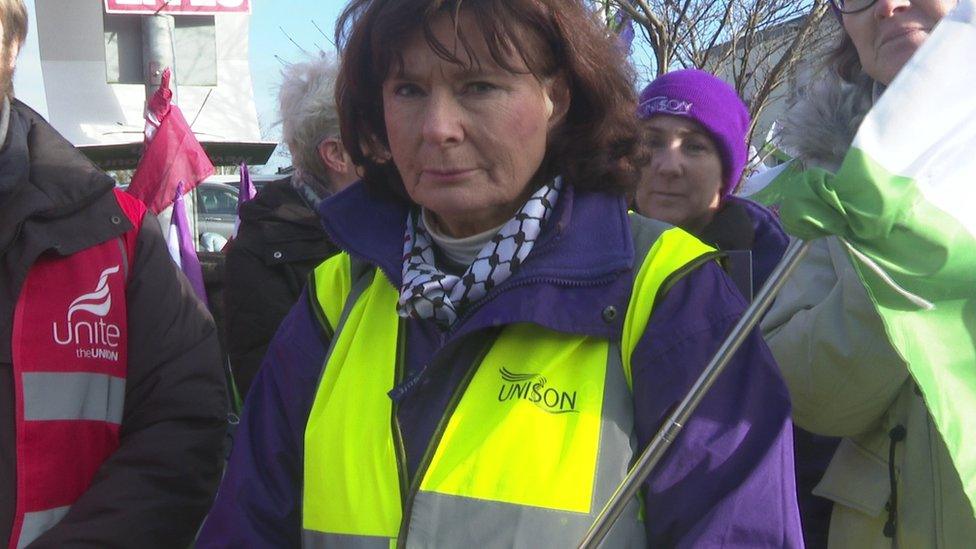
Deirdre Murphy has been a staff nurse at Daisy Hill hospital for over 24 years
"We want safe staffing levels because one nurse can not do the job of three people, it is totally unsafe," she said.
"We want respect and that respect should be reflected in getting an honest day's pay for an honest day's work, which we're not getting and which we haven't got.
"I have a warning for the government, we're not finished, we're not going anywhere, we have just started," she added.
Overstretched and overworked
Unite lead representative for the Northern Ireland Ambulance Service (NIAS) Norman Cunningham said stalemate at Stormont is not helping to resolve the issues.
"The hospitals are choc-a-block. People are on corridors, and everyone's being overstretched and overworked," he told Good Morning Ulster from the picket line at the Royal Victoria Hospital.
"There are no negotiations in Northern Ireland, there's no-one to talk to. There's no health minister. Civil servants have been placed in the unenviable position that they're having to implement decisions that they're not paid to do.
"This might be a short term pain… but we need to make sure these services are protected for the public. This action's for them, not just us."
The Royal College of Nursing (RCN) is not involved in Thursday's strike, but almost 8,000 nurses who are members of Unison will take part.
GMB members are continuing action short of strike.
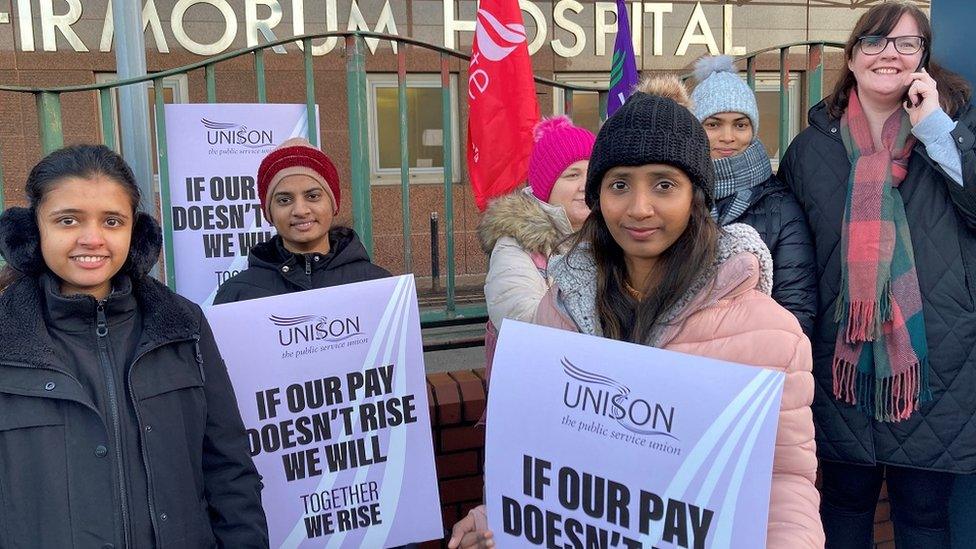
More than 20,000 NI healthcare staff are on strike
'NHS in a terrible state'
Anne Speed, from Unison, said the dispute was about more than pay.
"The NHS is in a terrible state and nowhere is worse than in Northern Ireland," she said.
She said Secretary of State Chris Heaton-Harris should be in Northern Ireland "talking about the crisis in our health service".
He is currently in the US on trade talks.
Unison RVH Branch secretary Conor McCarthy said the union was calling for direct negotiations with the British government.
He said "a huge amount" of healthcare workers had recently joined unions, which he hoped sent "a strong message out to the government that their attacks on unions isn't working".
'Food banks and second jobs'
Nipsa, which has more than 10,000 members, some of whom are nurses, said wages had been "progressively eroded through below inflation pay-rises and pay freezes".
"Trust workers have been forced to resort to food banks and take on additional shifts/second jobs," the union said in a statement.
The statement added that members were not only taking action over pay but in protest at staffing levels and travel reimbursement.
It said that in some front-line social work teams 42% of posts are unfilled, leaving staff with "unsustainable caseloads".


There is a furious new attitude among health workers and it's being felt not only on strike days but every day at work.
Staff, who have just brought us through a global pandemic, are feeling weary, disheartened even exasperated.
While there has always been a sense of general fed up-ness, the mood is much more discontented - making staff even more determined.
That mood is fuelled by an absence of local government and a feeling that no-one actually cares or even wants to engage.
At time of writing, communication from the unions to the Northern Ireland secretary has had no response.
Thursday's strike is for 24 hours as opposed to 12 which will have place more strain on patients and management.
Unions are pacing themselves they know they are in for the long haul. This action could last months.
They also have to keep members' morale up and the public on board.
As we approach February, unions, including teaching unions, are planning a joint hit.
While strike action to date has hit a nerve - they know future action will have to cause a lot more pain.

Unite represents 4,000 workers across the trusts and the Northern Ireland Ambulance Service (NIAS).
Northern Ireland representative Kevin McAdam said 87% of Unite's members had rejected a "below inflation pay award" with a vote in favour of strike action.
Alan Philson, a nurse in Londonderry and Unite representative, told BBC Radio Foyle healthcare workers "can't deliver the care without investment".
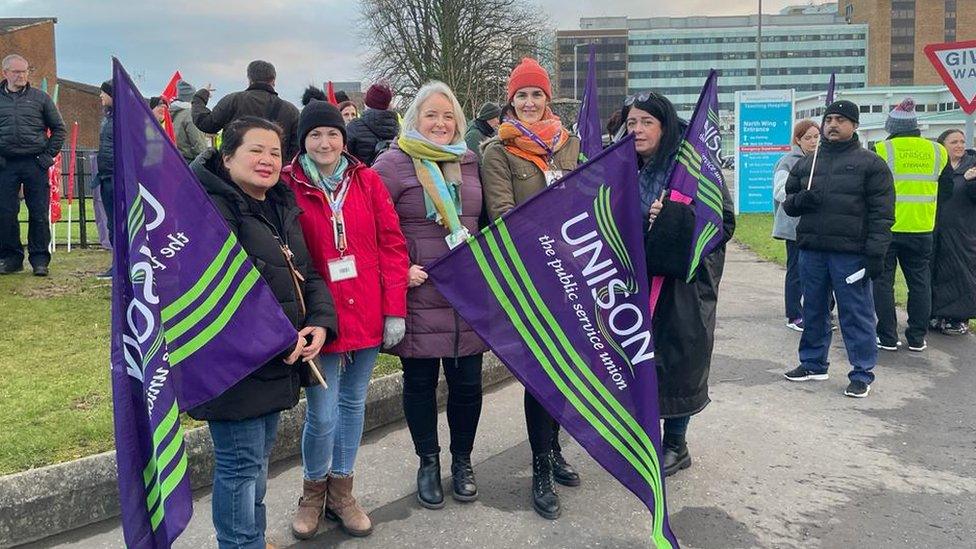
Striking health service workers say they want better pay and increased staffing levels
A NIAS spokesman said the service had talked to unions to identify what services would be exempt from strike action so the most clinically urgent patients could still be seen.
However, he said challenges were expected on Thursday and the NIAS would maintain the safety of patients with the greatest needs.
They said ambulances would still be available but patients with less clinically urgent needs could face long delays.
They appealed to the public to only call in life-threatening emergencies.
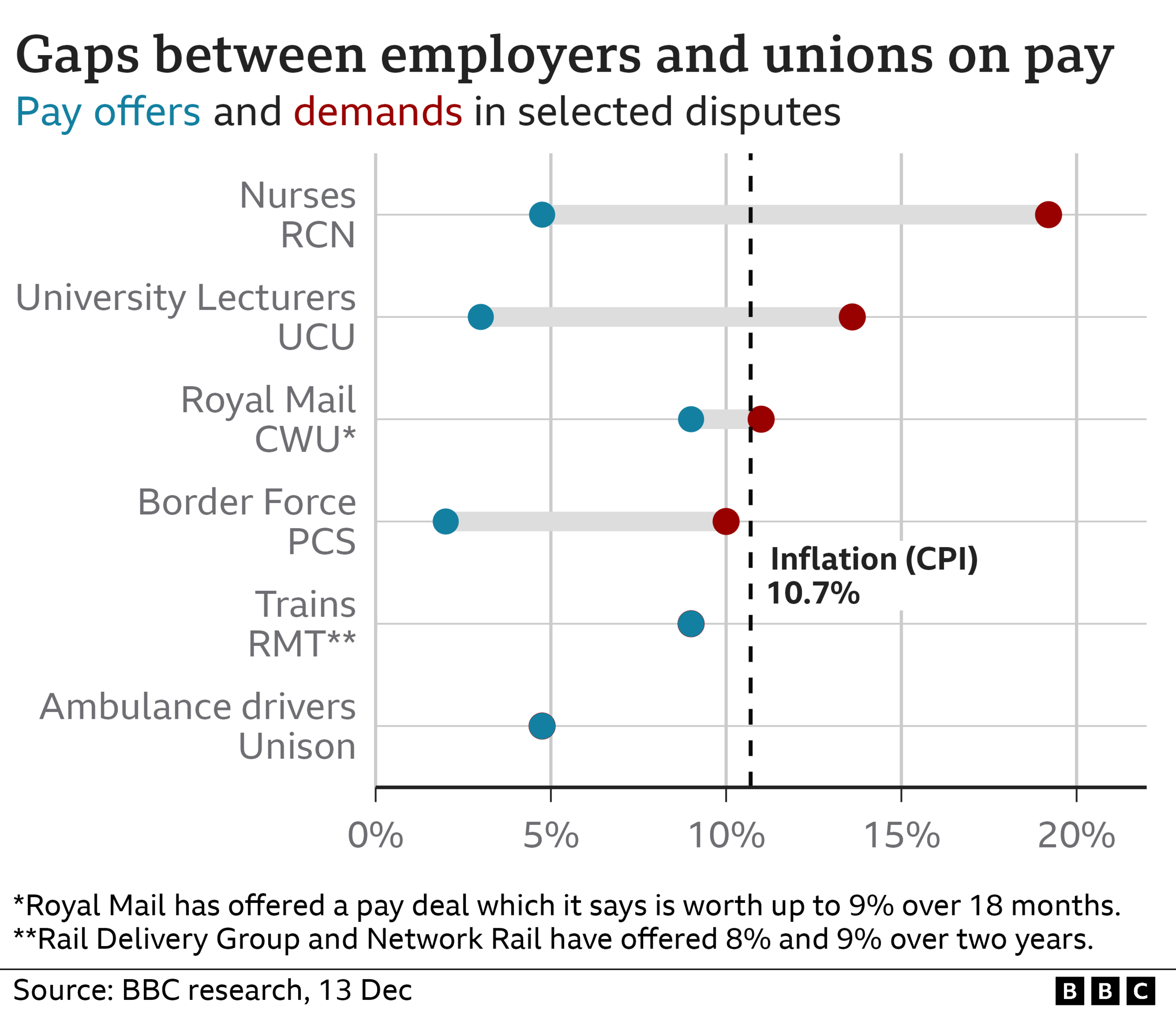

The Department of Health said it fully understood the frustration and deep concern of staff.
In a statement it said the department remained "extremely concerned at the scale of the current pressures on health and social care services - and the impact this is having on patients, service users, carers and staff".
The statement added: "The industrial dispute is a national dispute which is only resolvable at national level. Northern Ireland has a policy of pay parity with England HSC workers covered by the Agenda for Change framework."
Unison, Nipsa and GMB members last took part in a one-day strike in December.
In England and Wales, ambulance workers are to join nurses in taking strike action on 6 February in what will be the biggest NHS walkout in this dispute.
- Published1 August 2023

- Published8 December 2022
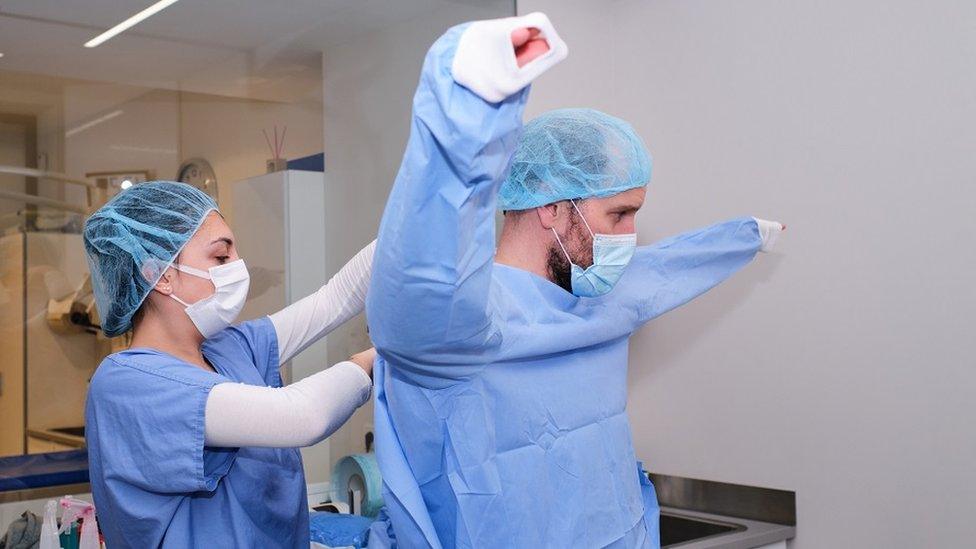
- Published21 December 2022
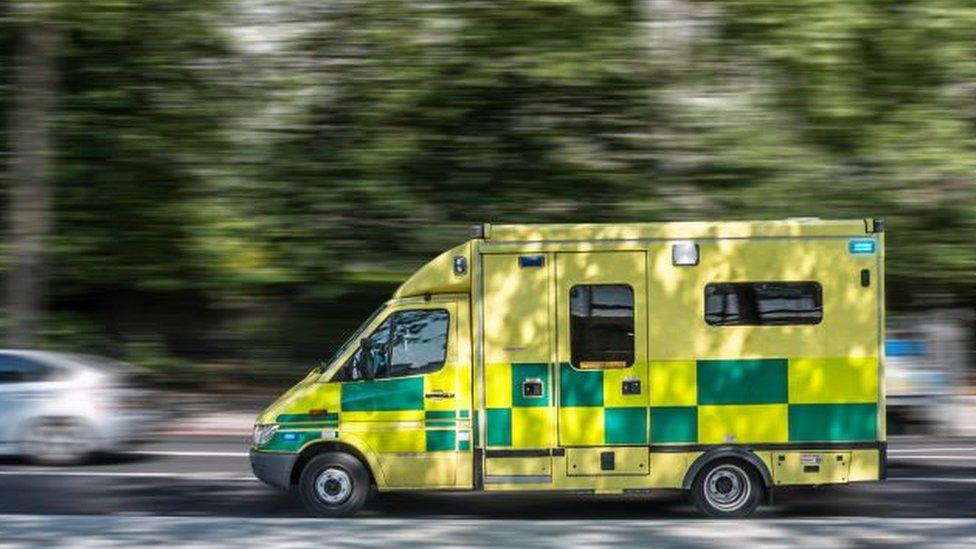
- Published20 December 2022
